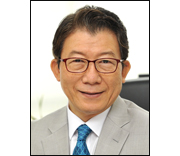-
[December 13, 2016 Korea times] Fast fashion yields many jobs for the young
- Date : 2016.12.15
- Views : 899
Fast fashion yields many jobs for the young

By Jeffrey I. Kim
Until the late 1960s, factor-endowment trade theories were dominant. The conventional trade theories predict which country will export what product. They argued that in the model of two factors, capital and labor, two products, and two countries, the relatively labor-abundant country tends to export labor-intensive products to the capital-abundant country given the identical technology.
In the early 1970s, however, Harry Johnson of the University of Chicago and others argued that the assumption of the same technology for different countries must be dropped in order to make better predictions of trade flows among them.
Fast advancement in science and technology has greatly changed the modes of telecommunication and transportation. People have come to enjoy using the internet and smartphones. The pattern of production and the flow of trade and investment have changed. In the context of the international division of labor, a new trend of supply chain has emerged. Supply chain activities involve the transformation of natural resources, raw materials, and components into a finished product that is delivered to the end customer.
Along with these changes, a new industry, called the “fast fashion” industry has emerged. Fast fashion is a term to express that designs move quickly to capture current fashion trends. Several large retailers such as Primark, Peacocks, H&M, Uniqlo, and Zara are the leading fashion retailers in this industry.
These retail fashion companies absorb a huge amount of the young labor force. Primark is an Irish clothing retailer operating 325 stores in many countries and employs 57,000 people. Peacocks is a fashion retail chain based in Cardiff, Wales. It has more than 400 retail outlets in the UK and more than 200 stores in 12 other countries employing over 60,000 people. H&M is a Swedish multinational clothing-retail company. It operates in 62 countries with over 4,000 stores and as of 2015 employed around 132,000 people. Uniqlo is a Japanese fashion retailer and has over 30,000 employees. Zara is the leader in this industry with 150,000 employees and 7,000 stores.
Not only do they enjoy huge profits but they are very popular among lower-income people. Moreover they receive moral support from their government because they hire a great number of young employees.
However, not all these companies automatically become successful. There are four critical factors that lead them to success. They are overseas operation of fashion stores, supply of price-based multiple brands, quick response to the preferences of customers, and fast delivery by a highly efficient logistics system.
Last week I visited Paris, Madrid, Munich and Brussels in turn. These are the capitals of France, Spain, Germany and Belgium and each country has its own international and domestic airport terminals.
I had to go through the immigration stand at Charles de Gaulle International Airport of Paris which was the first country I visited among the four. But for other countries, I did not have to go through passport control. The other international airports were like domestic terminals.
Fast fashion retail companies started in Europe and later spread to other parts of the world. Once a fast fashion retail company launched in a country in Europe, it can immediately operate stores in other parts of Europe if the items have turned out popular. They can execute mass production of the popular items at low cost and deliver them fast using express air cargo carriers. Depending on the nature of the items, their mass production can occur not only in Europe but any country in the world.
The fast fashion company does not have to start from Europe. It can originate in other parts of the world. Uniqlo is a good example. It started in Japan and has now become an internationally competitive fast fashion retailer. Likewise any other country can start a fast fashion business if it has innovating entrepreneurs, creative designers and fast delivery carriers. Korea can certainly join in this competitive industry.
These years, Korea has been suffering from high unemployment, especially record-high youth unemployment. The fast fashion industry can absorb a huge portion of the young labor force. Korea has great potential to become another leader country in the fast fashion industry in Asia.
http://www.koreatimes.co.kr/www/news/opinon/2016/12/197_219990.html










